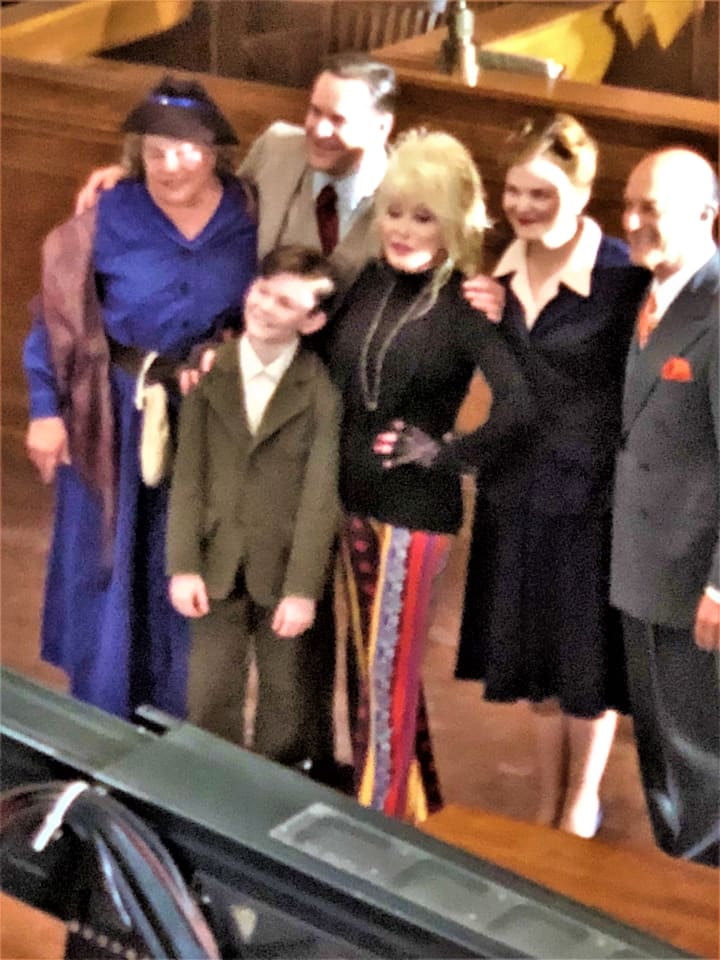So You Want to Work in Film and Television...
Observations of a Former Theatre Educator Turned Background Artist

I taught my first high school drama class in 1993. Back then, I was an English teacher with one year as a performance major at Kent State University and a few weeks of experience as technical director in the proscenium theater in my hometown. To say I was unprepared for the curriculum would be an understatement, but I tried my best and even managed to direct a one act play for competition. I soon discovered that I was a much better director than English teacher.
A major milestone for me came when I got involved with a local community theatre company who hired me to direct Guys and Dolls. Some of the cast and crew were theatre majors at a small 4 year college. The theatre director at the college quit without notice and the students approached the dean of the college about hiring me. I was shocked when they informed me at rehearsal that he wanted to hire me as an adjunct professor. Especially since I did not possess a master's degree in theatre, but had no graduate degree at all. So I made the only logical move and applied to grad school.
And not just any grad school. Imagine my surprise when I, a mediocre English teacher at a rural public middle school, got accepted into one of the finest theatre schools in the country. I was going to be a Florida State University Seminole! I would be studying where Burt Reynolds went to college! I quickly made plans to move my family to Tallahassee, but then something even more amazing happened: the Florida State University School of Theatre contacted me and asked me to come down to the campus for an interview. They offered me a teaching assistant position! I was stunned and returned to Georgia, excited about what the future might hold for me.
The next 2 years were as fantastic as any in my life. I took courses in lighting design, performance theory, and even got to take a directing course reserved for students who were pursuing their MFAs in that field. I acted in a play by Henrik Ibsen and was called "sincere and believable" by a local critic. I appeared in front of a camera for the first time when I was selected to play Cowboy 1 in a commercial for the Florida Sunshine Network. And, of course, I did my job as a teaching assistant for Intro to Theatre. As a matter of fact, at the end of second semester, I was offered the opportunity to co-teach the class with a fellow grad student.
For my thesis research, I chose a rather notorious play written by my favorite poet, Percy Bysshe Shelley in the early 1800s. I adapted "The Cenci" from a 5 act neoclassical tragedy which took 4 hours for volunteers to read aloud down to two acts which I was eventually allowed to direct and which ran just over 2 hours including intermission. I hope it doesn't make me sound like a braggart to mention that Dr. Jill Dolan of New York University and author of The Feminist Critic As Spectator sat in on a panel discussion where I presented my research proposal and wished me well with the project, even signing a copy of her book for me. All of this resulted in my earning my Master of Arts degree and the publication of my thesis: The Cenci: A Contemporary Production of a Classical Tragedy.
The Cenci, Florida State University, December, 1999




At the age of 55, I had an epiphany. At least that's how I describe it. Others have used the term, "midlife crisis." That is a subject I would rather avoid, however. No matter the motivating force, I became convinced that my creative talents could be better used in the professional entertainment industry. I set about what I still believe will be a successful career as a professional entrepreneur. I decided to form an LLC and try my luck. Thus, Mountain William Productions was born! I even came up with a slogan for the company: Mountain William because hillbilly just ain't nice!
Unfortunately, reality soon hit me square in the face! Despite all of my preparation and incredible talent, neither Hollywood nor Broadway showed up on my doorstep. I was shocked! How could these industry professionals not recognize a creative genius like me? Then I remembered a lesson from my classroom and realized how true it was. "Always maintain a close relationship with your family members if you are going to pursue a career in the arts," I had told my students. "You are going to need it." Thankfully, I had tried my best to do just that over the years in spite of the 70 hour work weeks which are required for high school drama teachers.
Yes, I said 70 hours. Many people fail to comprehend the hours teachers put into their jobs. This is especially true of those working in the educational theatre when you take into account the fact that drama teachers teach all day, attend all of the faculty meetings and training sessions all faculty members must attend, grade papers and projects, schedule parent/teacher conferences like all faculty members, hold after school rehearsals for their schools' productions, take on all responsibilities of producing and directing the shows, and schedule weekend performances. Additionally, many theatre teachers are assigned management responsibility of their schools' performance spaces. This responsibility includes scheduling the facility's usage and running lighting and sound equipment for any group which rents the facility. These rentals are held on weekends and holidays, so they don't conflict with school activities are a valuable financial resource for schools. In addition to those responsibilities, I also held the position of Literary Coordinator for many years. This is the title given to the head forensics coach in my home state of Georgia. So yes, my job did take a lot of time away from my family. I am a very fortunate man for having the support base I do despite all of the time I have put into my creative endeavors. My family, both immediate and extended, have come to my aid many times since my career shift, and I am very appreciative of it.
But enough of my background; let's talk about what I have observed in my brief time in the film and television industry. First, you must realize that I have entered this industry at the lowest level. I am a background artist, or what is more commonly known as an extra. It is simple but important work. Many people are unaware of the fact that all of those people seated in the crowd of the sporting event or at the tables inside the restaurant or even just walking down the street in a film or television program are hired actors. More often than not, we background artists go unnoticed and unappreciated. That's the nature of the job, but many famous actors broke into the industry doing it, and it should be viewed as what it is, an entry level position into the world of film and television production.
Now it's time to burst a few bubbles. One of the more noticeable things a theatre teacher encounters is the exuberance of the young actors and the hesitancy of students to work on the stage crew. That is because working on the crew is often considered mundane and doesn't have the glamour associated with performing. If the truth be told here, anyone considering a career in the performing arts should have at least a working knowledge of all aspects of production. My high school theatre teacher stressed this to me, and I will always be grateful to her for doing so.
As I mentioned earlier, my first collegiate theatre experience was as a performance major at Kent State University. When I had to leave college due to financial difficulties, I returned to my hometown, Ashtabula, Ohio and applied for a job as the technical director of the local theater. During the interview, the theater manager said something along the lines of, "I know you can't major in theatre at a university and not know about technical work." I didn't correct him, but the truth was that during my short time at Kent State, I had appeared as an actor in 4 productions and only worked stage crew on 1. My responsibilities on that production consisted of turning a revolving set around once a night. I was not exactly what one would call highly qualified for the job. But somehow I got hired. The result was a very steep learning curve as I tried to prepare for the touring shows which graced our stage. I soon learned who the people were that were pivotal in determining the success or failure of productions: the crew.
As a director, I have always adopted a minimalistic approach to staging. This is due to my lack of skill in scene and costume design for the most part, but I must admit it is a technique which has served me well with touring productions. I suppose I would be considered an actors' director, which is not at all surprising given my background.
The lesson I learned from my high school theatre teacher concerning the importance of technical knowledge still rings true today. If you spend any time working on the sets of film and television productions, or in the professional theatre, you will see who holds the clout in the world of professional entertainment, and it is not the actors.

On the Set of First Man, 2018
Ok! The reason for this article is to let you know what is expected of anyone working in the film and television industry. As I stated earlier, I have always considered myself to be an actor first and foremost, and all of my experience in film and TV is in nonspeaking roles.
I have about 70 theatrical credits as an actor, playwright, director, and producer. None of that means anything in the film industry, so don't be surprised if Hollywood is not entirely wowed by your high school credentials even if you played the lead in every high school play. Even graduates from the most well respected college, university, and conservatories must start at the very bottom of the ladder and work their way up. In truth, longevity in the performing arts is a matter of durability more than talent.
That being said, there is only one reason to follow the creative path in the entertainment industry. The reason is actually quite simple. You should pursue this career because it is part of who you are as a person. If you can be happy without performing, by all means, don't go into show business. There are two many heartbreaks and very little financial reward unless you are extremely lucky and take advantage of every opportunity which comes your way.
If you have chosen this career path despite my warnings of frustration and economic hardship which you will undoubtedly face, I will gladly share my experiences and accumulated knowledge with you. I will continue to do so by comparing my experience in educational theatre with what I have observed on the sets of film and television productions.
First, you must understand the goals of both of these institutions. In education, the primary goal of all concerned is the completion of course requirements for the attainment of a diploma or its equivalent. This goal sometimes supersedes the needs of the institution's theatrical productions. Quite often, grades in classes unrelated to performance affect a student's eligibility to participate in after school activities such as rehearsal or performance of a play. This is due to the school's goal of a well rounded education for all students. Although this conflict can be viewed in a negative light by those affected, it is a very sound policy. Most young people are not certain of their career paths while enrolled in high school, and a well rounded general education leaves options for exploring careers which the student might not have considered at this point in his or her life. Additionally, one must consider the aforementioned economic uncertainty of a career in the arts. While core classes might be a dull or unpleasant experience for some creative minded individuals, they can prove useful in gaining employment outside of the film and television industry or in acquiring a day job to use the vernacular of the industry.
Additionally, schools are interested in the social development of their students. This often manifests itself in punishment such as detention or suspension for disciplinary infractions. When these unfortunate occurrences take place among the cast or crew of a production, the results can be detrimental to the performance as many schools have a policy which prohibits participation in after school activities while students are being punished by serving detention or are under suspension. Although I have seen these disciplinary measures modified for some students during my teaching career, it is very rare for an up and coming actor to receive such treatment. To be blunt, young artists are not usually given such preferential treatment. When these exceptions occur, it is usually an athlete who receives permission to participate. I believe this is due to our society's fascination with sports and non-appreciation of the arts, but that is a discussion for another day. In short, one must develop acceptable social skills to be successful in the entertainment industry, and school discipline codes are useful in developing those skills.
So, one might ask, if those are the expectations of performing artists in public high school theatre programs, what are the expectations in the film and television industry? And, more importantly, what, if anything, do the two types of performance have in common? Although I am no expert in acting for the camera, I am an astute observer and would like to try and answer those questions based on not only my limited personal experience, but also on my observations of some of Hollywood's most popular screen actors.
As I mentioned earlier, the purpose of schools is to create well rounded individuals. The film and television industry, on the other hand, has the primary objective of making money. Some people might find this statement offensive and cite artistic integrity and the desire to create great art as the primary objective, but that is secondary to the almighty dollar. Just like any other business, the goal of the producer and everyone else involved is to make as much money as possible. An example of this is when I booked a gig playing a New York pedestrian and was told to walk quickly down the sidewalk past the principal actors. I asked my fellow actors about my character's motivation in the scene and received the same reply from everyone I asked, "Your paycheck!" I had to develop my own back story for my character and decide why he was hurrying down the sidewalk. To the director, I was a gentleman in a suit and fedora walking past the actors, but, in my mind, I was rushing to a very important business meeting. It all played out the same in the end. I rushed past the principals during the scene and received my day's pay in the mail approximately 2 weeks later.
These differences in purpose manifest themselves in many different ways. The first which comes to mind is attendance. Although school drama programs might excuse students for tardiness or absences for various reasons, this is simply not the case in the realm of professional entertainment. If one reports late to work, or worse yet, fails to show up at all for a professional gig, that person will be blacklisted by the casting agency and, since the entertainment industry is a small community, word will spread and that person might soon find himself or herself not being booked at all.
Courtesy or appropriate behavior is another way that the high school experience differs from the professional realm. As a former educator, I am well aware of the antics and discourteous behavior some teenagers are prone to demonstrate. I have personally witnessed fights, abusive language and vandalism on or around the high school stage. I can assure you such behavior would never be tolerated on a professional film set. During my teaching career, I was personally assaulted, mocked and disrespected many times. I dealt with these discipline issues by removing student offenders from productions but was less successful in curbing classroom offenses due to constraints put upon me by administrators. In the professional world, anyone engaging in such activities would simply be fired. And, once again, I remind you the entertainment industry is a small community, and word spreads quickly if one is difficult to work with. Even well established, veteran actors have had their careers cut short due to improper behavior. Please let this serve as a warning should you be prone to such outbursts.

Ms. Dolly Parton
Finally, I would like to discuss some differences I have observed between the arts of theater and film. When I was a high school student, my friends and I often discussed the possibility of appearing in films and television shows. We were unaware of the differences between acting for the stage and acting for a camera. Since my background is in the legitimate theatre, I am very aware of the importance of well rehearsed blocking and line memorization. Imagine my shock then, when on my first film set, the blocking for over 100 actors was changed mid scene and professional actors were dropping lines and laughing about their miscues. In the film industry, if something is not done to the director's satisfaction, there is always the opportunity to reshoot the scene. You often hear an assistant director yell "Cut!" and a production assistant will then walk up with a clapperboard and the scene will be redone. Furthermore, the same scene is usually shot from many different angles and the film is spliced during post production, so it is not unusual for a 5 minute scene to take several hours to film. The difficulty for the actors is the need to repeat the same movements and reactions many times over unless told to make adjustments by the production assistants or assistant directors.
Another difference between a set for film or television and a theater is the amenities. When preparing for a play, actors usually have nice dressing rooms complete with makeup mirrors and a modicum of privacy. This is not my experience on any film or television shoot. Usually, the dressing rooms are cordoned off areas of large tents or smaller tents inside a large warehouse like space. I have even been handed my costume and told to change inside the honey wagon (a nickname for a trailer with commodes, urinals and sinks). After changing into costume, film and TV actors are asked to stand in line to see professional hair stylists and makeup artists who are also set up in a makeshift fashion. After being deemed ready for the camera, the actors are sent to a holding area which can range from another area inside the same tent to a large room in a rented building such as a church or, worse yet, outside in the blazing sun or bitter cold. Stage actors enjoy the comfort of a green room even if they are only playing a walk on role, but background artists are forced to endure discomfort for the long hours when they are not needed for a scene.
There are major differences in style when it comes to acting in the two genres. One of the most difficult things I have taught young stage actors is the importance of projecting to the back of a large proscenium theater. One must also use exaggerated gestures to convey emotion to a large house. In film, subtlety is key. Because of the use of close up photography, a single tear or shift of focus without even moving the body is easily noticeable. During my stage career, I have played to audiences in small houses where audience members were inches from the cast. If you have not had this experience, I would suggest rehearsing in front of a mirror in order to get the appropriate effect.
In closing, let me reiterate that acting in the film and television industry can be quite difficult, and financial security for those who choose this career path is difficult to achieve. However, if you truly have the desire or feel an innate need to perform, you cannot let these negative facts deter you.
The same can be said for those creative artists who work behind the scenes, the designers, painters, stitchers, and writers who are the backbone of the performance industry. Do not be dissuaded by the difficulty in acquiring a foothold in the industry. Be steadfast to your passion to create and weather the storm. I wish you the best and hope that you... BREAK A LEG!
About the Creator
Fred Bobbitt
I am a rural American poet. I find inspiration in the simple things which comprise a country lifestyle.






Comments
There are no comments for this story
Be the first to respond and start the conversation.